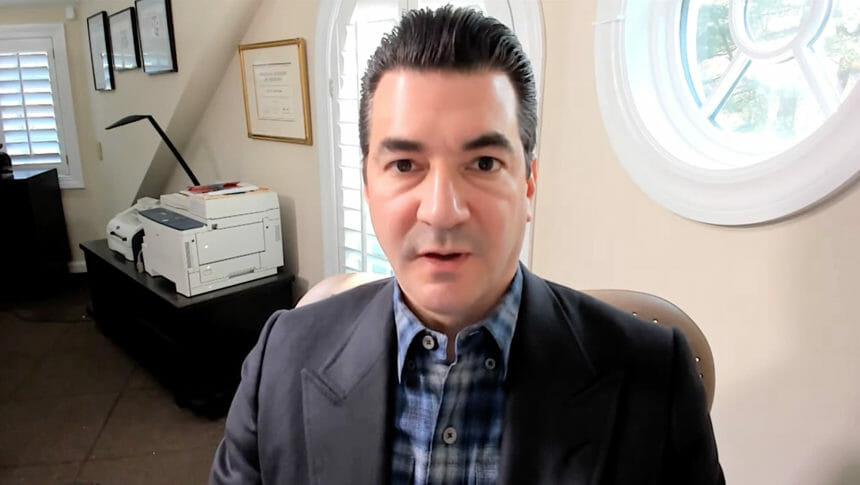
Former Food and Drug Administration Commissioner Scott Gottlieb, M.D., had some sobering words Tuesday for a senior living industry that has been battling the coronavirus pandemic for more than eight months now.
“By the end of November and into December, the picture around the country — it’s bad now, but I think it’s going to look much worse. I think that we’re entering a very difficult period,” he told those attending his keynote address at the LeadingAge Annual Meeting Virtual Experience. For the session, LeadingAge President and CEO Katie Smith Sloan posed questions to Gottlieb, who was FDA commissioner from 2017 to 2019.
“We’re going to see a lot of disease. We’re, unfortunately, going to see a lot of deaths from COVID before we get to the other side of this,” he said, likening the present to “the seventh inning of the acute phase of the pandemic.”
Even 2021 is “not going to be a normal year,” said Gottlieb, who predicted that next year will be a “year of transition” related to the pandemic. At the earliest, he said, most Americans will not be able to be vaccinated until late in the second quarter or in the third quarter of 2021, although long-term care residents and workers are likely to be prioritized. But the prospect of vaccination, more widespread testing and the availability of additional therapies could mean that next winter, the virus won’t circulate as aggressively as it is now, and that, overall, people who become ill may be less likely to have a “bad outcome,” he said.
Until then, said Gottlieb, who now is a special partner on the healthcare investment team of venture capital firm New Enterprise Associates and a resident fellow of the American Enterprise Institute, testing is “the single best tool we have to get control of the epidemic and try to mitigate the risk of spread” within settings such as assisted living and affordable senior housing communities.
“The reality is, we now have testing tools that can be deployed more widely,” he said. “When we were back in the spring, when there wasn’t testing available, or even in the summer when mostly what we were relying on was PCR-based testing, which just couldn’t handle the flow, deploying testing widely into these settings was pretty difficult. But now you do have things like the BinaxNow, $5 a test, [which] can be run on site just by a trained technician.”
And COVID-19 tests are going to become easier to obtain in the marketplace, Gottlieb said. “For a while, you couldn’t get your hands on them because … the federal government, under the [Defense Production Act], was buying up all of the BinaxNOW tests and all the BD Veritors. Now I think that they’re going to be more widely accessible.”
Gottlieb described Abbott’s BinaxNOW rapid-results antigen tests for COVID-19, which the federal government is sending to senior living communities, as “good tests.”
“People like them for good reason,” he said. “They’re inexpensive. They’re easy to use. They can be deployed widely.”
But anyone who has a positive result on a point-of-care antigen-based test should get tested with a PCR test to confirm the result, and anyone who has a negative result with an antigen-based test but who has symptoms of COVID also should take a PCR-based test, he recommended.
Controlling the infection in local communities also is critical to protecting older adults who live in places such as senior living communities, Gottlieb said. “The real challenge is that, if you have high prevalence within a local community, inevitably, the virus is going to get into high-risk settings. You can’t just create a perfect protective bubble around a certain space,” he said.
It’s also important that anyone working in or visiting a long-term care building be screened and be required to wear a mask, Gottlieb said, noting that studies have shown that N95 masks are “substantially better” than surgical masks, which in turn are more protective than cloth masks.
Gottlieb, who sits on the board of Pfizer, which is developing a COVID-19 vaccine, said that people who work in settings where there are high-risk individuals “should be strongly encouraged to get immunized” when a vaccine becomes available. If the data show that the vaccines are safe and effective, “I think people are going to be sufficiently motivated to get vaccinated,” he added.
When a vaccine becomes available, people most likely will need to be vaccinated against the virus “on some kind of recurrent schedule,” Gottlieb predicted. “It’s not going to be like chicken pox or smallpox, where you get what we call sterile immunity, where you get immunized, or after you get the infection, you can never get it again,” he said. “This is going to be an infection that people are going to get over and over again.”
For now, however, he said, “My advice to people would be: Don’t let your guard down now. Continue to be vigilant, and be even more careful, because this is really probably going to be the most dangerous phase of this pandemic.”



